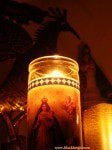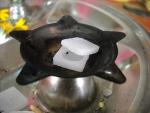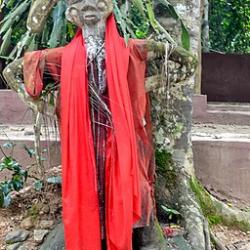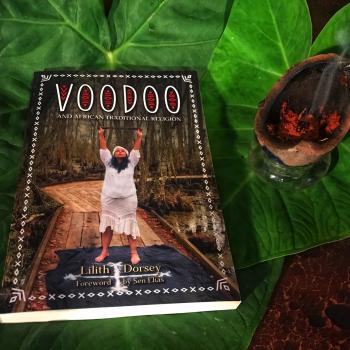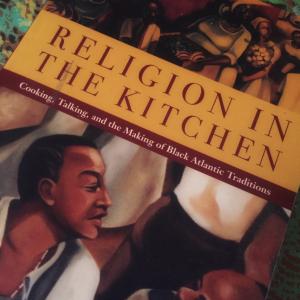
Taste your honey, thank your ancestors, Elizabeth Perez’s book Religion In The Kitchen reminds us of the important rituals and rites surrounding food in the African Traditional Religions.
Perez begins by explaining some of the more complex elements of the religion. She tells about the home as a temple. This functions both as a place for ritual, and also divination. She talks about what scholar Dana Rush describes as the “Vodou Vortex”, where elements of various Afro-Diasporan practices are incorporated into other traditions. This is not viewed as chaotic, but instead functioning to allow the religion to “convert objects, particularly commodities, from one aesthetic regime to another, without requiring that the items countenance ‘monolithic interpretation.’ ”
This book is, for the most part, an in-depth analysis of a single spiritual house, or ile. This particular house, Ile Laroye, is located in Chicago. Perez shows how some traditional African beliefs are given respect and honor. This is in addition to keeping some customary Cuban practices too.
Extremely valuable here is the author’s analysis of Ache (also called ashe.) This universal life force inhabits all things, residing “dynamically in both subjects and objects, animate or inanimate: humans, animals, plants, rites, among other worldly phenomena. ” She goes on to explain “in parting as in greeting, ache means the same as amen, ‘so be it.’ ” This phrase has become very popular in the community, as respect for the ache of things becomes clear.
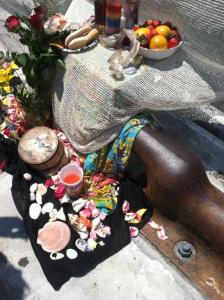
Religion In The Kitchen: Food and Family
The second chapter of the book focuses on “Kitchen, Food, and Family ” Perez discusses not only the role of food in Lucumi, but also in other Black Atlantic traditions. While doing this the book keeps true to it’s academic roots.
Consequently, this book is not an easy one, it’s not a cookbook, most certainly more of a textbook. But nonetheless, and ever the more, it is full of valuable information for people at all stages of the religion. It earned accolades within the anthropology community. Religion In The Kitchen is the winner of 2017 Clifford Geertz Prize in the Anthropology of Religion. This is presented by the Society for the Anthropology of Religion section of the American Anthropological Association. It was also a 2017 finalist for the Albert J. Raboteau Prize for the Best Book in Africana Religions presented by the Journal of Africana Religions. Elizabeth Pérez is Assistant Professor of Religious Studies at the University of California, Santa Barbara.
As always if you enjoy what you read here please remember to like, comment, and share !



